Greek Numbers: How to Count from 1-1000+ in Greek
Looking to learn Greek numbers? Here’s some good news: once you’ve learned how to count from 1 to 20 in Greek, the rest is way easier since the other numbers all follow the same pattern.
And I know it gets easier, because I’m someone who’s learned to speak fluent Greek.
In this article, we’ll cover Greek numbers from 1 to 1000, in addition to some FAQs and historical information for those who love fun facts.
Table of contents
Before we get into the article, if you are interested in learning Greek yourself, you should check out my absolute favourite resource for learning Greek, Greekpod101.
For all language projects I’ve taken on, this has been by far my favourite resource, since it’s a podcast style learning resource that covers many aspects of the language much better than traditional courses do.
It also tackles the issue of listening comprehension better than literally anything else out there, since its catalogue of lessons eases you in with simple lessons at first that get progressively harder, and you can listen to them for a huge range of topics better suited to your hobbies and interests.
They have a free option for anyone who wants to test them out, based on just their limited recent episodes, but exclusively for Fi3M readers, you can get 20% off if you sign-up for any of their subscriptions, which allow you to access their full catalog of many hundreds of lessons, using the code FLUENT3.
I highly recommend this to all Greek learners!!
Greek Numbers 1-10
Let’s start with the most important part: the first numbers you learn in any language, 1 to 10. It’s best to learn how to pronounce, read, and write these numbers very well before rushing to learn the numbers after 10.
Here is how you count from 1 to 10 in Greek:
- 1 – ένα (ena): “one”
- 2 – δύο (dio): “two”
- 3 – τρία (tria): “three”
- 4 – τέσσερα (tessera): “four”
- 5 – πέντε (pende): “five”
- 6 – έξι (eksi): “six”
- 7 – επτά (epta): “seven”
- 8 – οκτώ (okto): “eight”
- 9 – εννέα (enea): “nine”
- 10 – δέκα (deka): “ten”
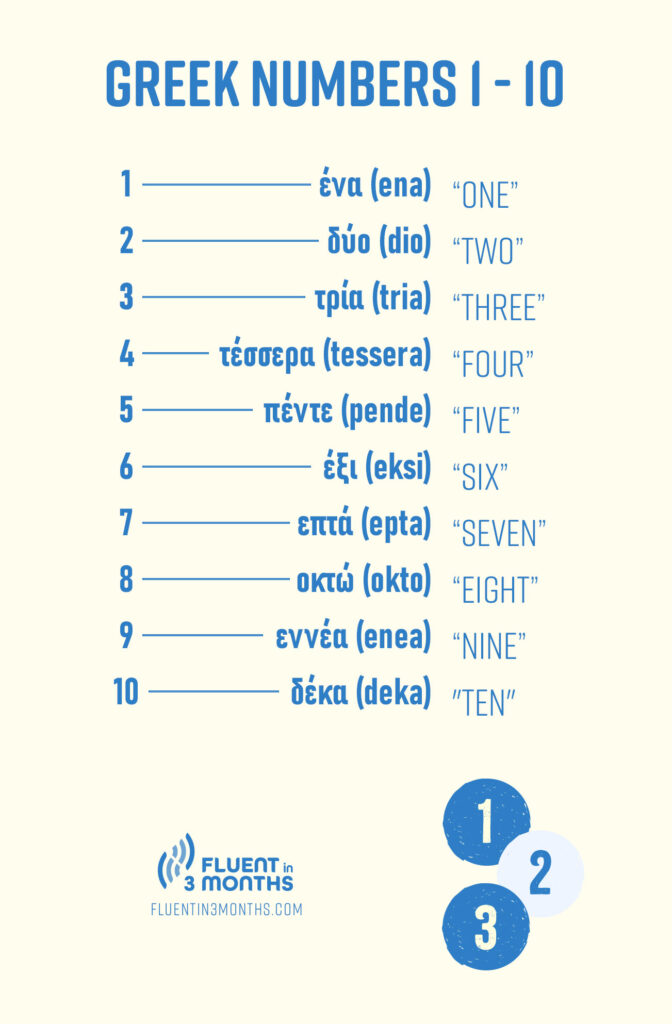
Greek Numbers 11-19
Once you’re confident counting from 1 to 10, you will see that numbers between 10 and 20 are way more regular.
“Eleven” in Greek is έντεκα (endeka) and “twelve” is δώδεκα (dodeka). And you kind of already know the numbers from 13 to 19. How? Let me explain:
The numbers from 13 to 19 all start with δέκα (“ten”). Then, you add the other number depending on which number you want to tell. For example, fourteen is δεκατέσσερα; δέκα (“ten”) + τέσσερα (“four”) = δεκατέσσερα (dekatessera).
You can use the same logic until 19.
- 11 – έντεκα (endeka): “eleven”
- 12 – δώδεκα (dodeka): “twelve”
- 13 – δεκατρία (dekatria): “thirteen”
- 14 – δεκατέσσερα (dekatessera): “fourteen”
- 15 – δεκαπέντε (dekapende): “fifteen”
- 16 – δεκαέξι (dekaeksi): “sixteen”
- 17 – δεκαεπτά (dekaepta): “seventeen”
- 18 – δεκαοκτώ (dekaokto): “eighteen”
- 19 – δεκαεννέα (dekaenea): “nineteen”
Greek Numbers 20-100
20 in Greek is είκοσι (ikosi). 21 is 20+1, so είκοσι ένα. (ikosi ena). As you may have guessed, 22 is είκοσι δύο (ikosi dio), 23 is είκοσι τρία (ikosi tria), and so on. Keeping this logic in mind, we can figure out how to say bigger numbers as long as we know how to say 20, 30, 40, 50, 60, 70, 80, 90, and 100.
- 10 – δέκα (deka): “ten”
- 20 – είκοσι (ikosi): “twenty”
- 30 – τριάντα (trianda): “thirty”
- 40 – σαράντα (saranda): “forty”
- 50 – πενήντα (peninda): “fifty”
- 60 – εξήντα (eksinda): “sixty”
- 70 – εβδομήντα (evdominda): “seventy”
- 80 – ογδόντα (ogdonda): “eighty”
- 90 – ενενήντα (eneninda): “ninety”
- 100 – εκατό (ekato): “one hundred”
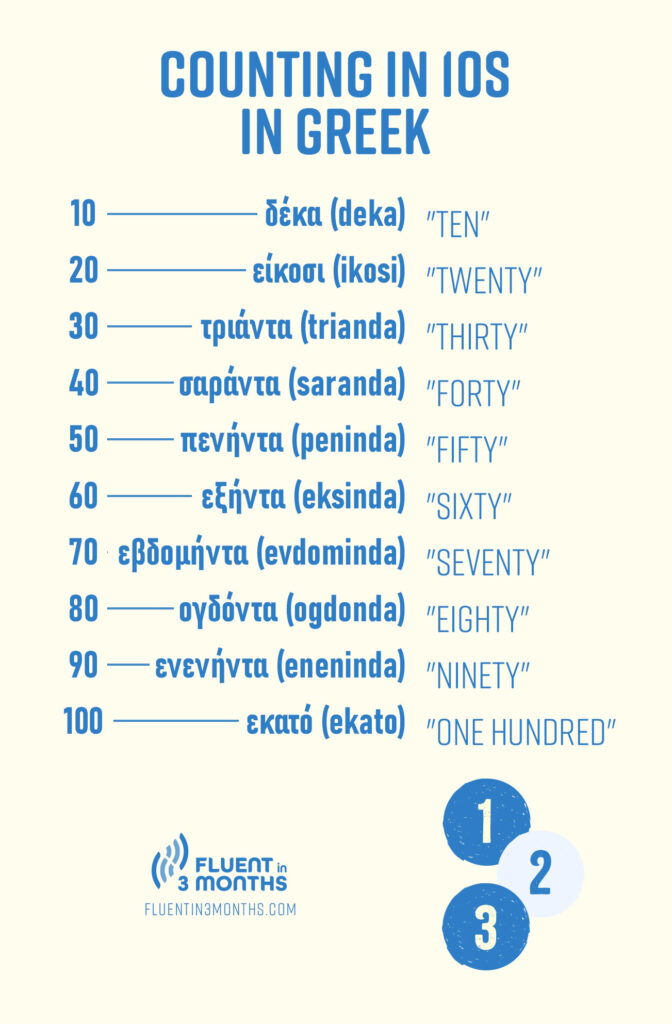
Here are some examples of the numbers in between:
- 34 – τριάντα τέσσερα (trianda tessera): “thirty four”
- 59 – πενήντα εννέα (peninda enea): “fifty nine”
- 71 – εβδομήντα ένα (evdominda ena): “seventy one”
- 83 – ογδόντα τρία (ogdonda tria): “eighty three”
Greek Numbers After 100
100 in Greek is εκατό and 101 is εκατόν ένα (ekaton ena). In numbers between 101 and 199, εκατό becomes εκατόν. After εκατόν, they again follow the same logic. For example, 118 is εκατόν δεκαοκτώ (ekaton dekaokto), which is the combination of εκατόν and δεκαοκτώ.
Some examples are:
- 105 – Εκατόν πέντε (ekaton pende): “one hundred and five”
- 122 – Εκατόν είκοσι δύο (ekaton ikosi dio): “one hundred and twenty two”
- 152 – Εκατόν πενήντα τέσσερα (ekaton peninda tessera): “one hundred and fifty four”
- 172 – Εκατόν εβδομήντα δύο (ekaton evdominda dio): “one hundred and seventy two”
- 199 – Εκατόν ενενήντα εννέα (ekaton eneninda enea): “one hundred and ninety nine”
From 200 and onwards, you need to know how to say the hundreds. Pay attention to the endings — 200 is διακόσια, for example, notice that it’s written δια not δύο as in number two.
- 200 – διακόσια (diakosia): “two hundred”
- 300 – τριακόσια (triakosia): “three hundred”
- 400 – τετρακόσια (tetrakosia): “four hundred”
- 500 – πεντακόσια (pentakosia): “five hundred”
- 600 – εξακόσια (eksakosia): “six hundred”
- 700 – επτακόσια (eptakosia): “seven hundred”
- 800 – οχτακόσια (oktakosia): “eight hundred”
- 900 – εννιακόσια (enniakosia): “nine hundred”
- 1000 – χίλια (hilia): “one thousand”
Greek Numbers in History
Similar to Babylonian, Egyptian, and Phoenician numeral systems, Ancient Greek numbers were also based on repeating single strokes up until number 9. So 9 would be expressed as “||| ||| |||.” For the number 10, different civilisations used different symbols. For example, in Crete, 10 used to be written as “―”.
Phoenicians influenced the first elaborate Greek number system. Today, it is known as Attic numerals, and it included using the first letter of each number as its symbol. So, for example, 5 was marked with the letter Π because pende starts with “pi,” Π / π. 10 was “Δ,” because deka starts with the letter “delta,” Δ / δ. Other Greek number symbols were:
- 100 = Η for ἑκατόν (hekaton)
- 1000 = Χ for χίλιοι (hilioi)
- 10000 = Μ for μύριοι (myrioi)
Ordinal Numbers in Greek
How do you say “first”, “second”, and “third” in Greek? For that, you need ordinal numbers. Below, you can find the masculine versions, ending with ος (os). Depending on the gender, don’t forget to change the ending to η (i) for feminine and ο (o) for neutral nouns.
- 1st – πρώτος (protos): “first”
- 2nd – δεύτερος (defteros): “second”
- 3rd – τρίτος (tritos): “third”
- 4th – τέταρτος (tetartos): “fourth”
- 5th – πέμπτος (pemptos): “fifth”
- 6th – έκτος (ektos): “sixth”
- 7th – έβδομος (evdomos): “seventh”
- 8th – όγδοος (ogdoos): “eighth”
- 9th – ένατος (enatos): “ninth”
- 10th – δέκατος (dekatos): “tenth”
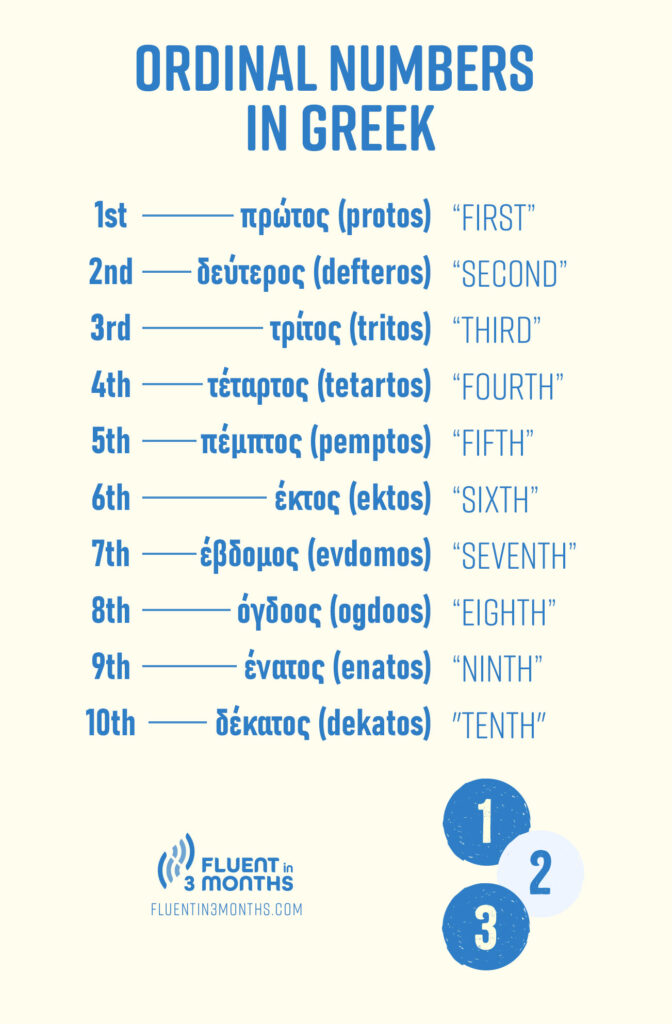
Using Greek Numbers in Real Life
Now that we’ve learned the numbers in Greek, let’s take a look at four daily life situations where we would use numbers: telling what time it is, asking how much something costs, giving someone our phone number, and talking about our age.
1. How to Tell Time in Greek
When someone asks you Τι ώρα είναι (ti ora ine?) “What time is it?” your answer will be a number. Here is how to say the hours in Greek — some of them have slightly different endings compared to the numbers from 1 to 10 we’ve just learned:
- 1 – μία (mia): “one”
- 2 – δύο (dio): “two”
- 3 – τρεις (tris): “three”
- 4 – τέσσερις (teseris): “four”
- 5 – πέντε (pende): “five”
- 6 – έξι (eksi): “six”
- 7 – επτά (epta): “seven”
- 8 – οκτώ (okto): “eight”
- 9 – εννέα (enea): “nine”
- 10 – δέκα (deka): “ten”
- 11 – έντεκα (endeka): “eleven”
- 12 – δώδεκα (dodeka): “twelve”
- Τι ώρα είναι; (ti ora ine?): “What time is it?”
- Η ώρα είναι δύο (i ora ine dio): “It’s two o’clock.”
- Η ώρα είναι έντεκα (i ora ine endeka): “It’s eleven o’clock.”
Here are some other examples for more vocabulary:
- 10:15: Δέκα και τέταρτο (deka ke tetarto): “Quarter past ten”
- 07:45: Oκτώ παρά τέταρτο (okto para tetarto): “Quarter to eight”
- 08:30: Oκτώ και μισή (okto ke misi): “Half past eight”
2. How to Say “How Much Is It” in Greek
To say “how much does it cost” or “how much is it” in Greek, you can say Πόσο κοστίζει αυτό; (poso kostizi afto). Here are some possible answers to these questions.
- Αυτή η τσάντα κοστίζει σαράντα ευρώ (Afti i tsanda kostizi saranta evro): “This bag costs forty euros.”
- Αυτό το μολύβι κοστίζει ένα ευρώ (Afto to molivi kostizi ena evro): “This pencil costs one euro.”
- Αυτό το φυλλάδιο είναι δωρεάν. (Afto to filadio ine dorean): “This brochure is for free.”
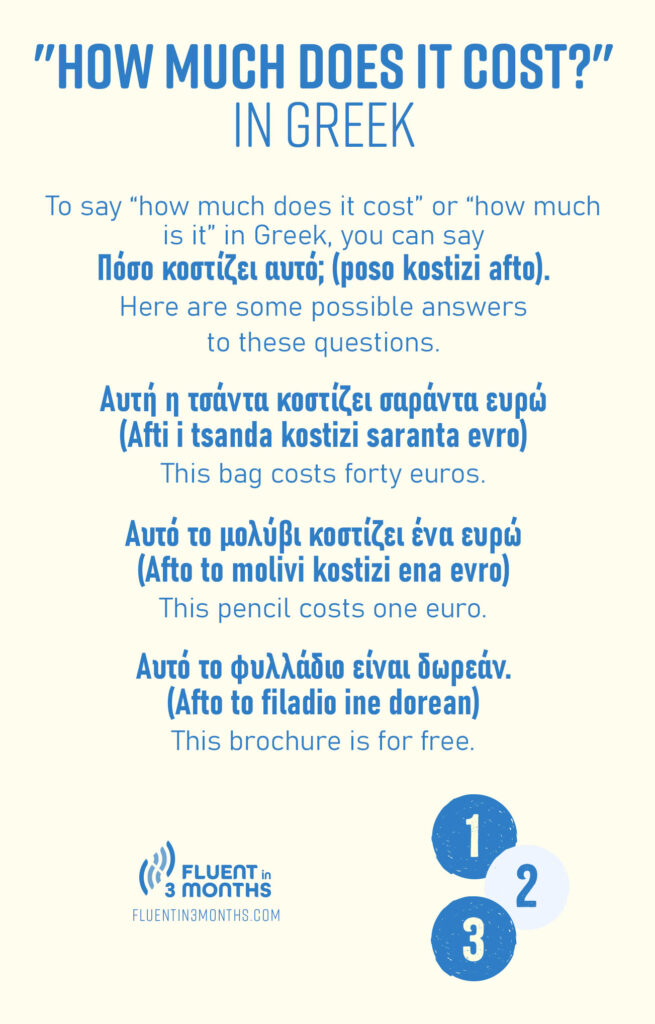
3. How to Tell Your Phone Number in Greek
You can tell your phone number in Greek by pronouncing each digit one by one or two at a time.
- Ποιος είναι ο αριθμός τηλεφώνου σου; (Pios ine o arithmos tilefonu su?): “What is your phone number?”
- Το τηλέφωνό μου είναι έξη, εννέα, πέντε, πέντε, τρία, επτά, οκτώ, ένα, πέντε, οκτώ. (To tilefono mu ine eksi, enea, pende, pende, tria, epta, okto, ena, pende, okto): “My phone number is 6-9-5-5-3-7-8-1-5-8.”
- Το τηλέφωνό μου είναι έξηντα εννέα, πενήντα πέντε, τριάντα επτά, ογδόντα ένα, πενήντα οκτώ (To tilefono mu ine eksinda enea, peninda pende, trianda epta, ogdonda ena, peninda okto): “My phone number is 69-55-37-81-58.”
4. How to Tell Your Age in Greek
Age is just a number. Well, this saying was probably not intended for language learners, but “How old are you” is one of the first questions we come across in a new language, and the answer is indeed a number.
- Πόσο χρονών είσαι (poso hronon ise?): “How old are you?” (informal)
- Πόσο χρονών είστε (poso hronon iste?): “How old are you?” (formal or plural)
- Είμαι δεκαοκτώ χρονών (Ime dekaokto hronon): “I am 18 years old.”
- Είμαι είκοσι πέντε χρονών (Ime ikosi pende hronon): “I am 25 years old.”
- Είμαι τριάντα χρονών (Ime trianda hronon): “I am 30 years old.”
FAQs about Numbers in Greek
How do you count from 1 to 20 in Greek?
Here are the numbers from 1 to 20 in Greek:
- 1 – ένα (ena): “one”
- 2 – δύο (dio): “two”
- 3 – τρία (tria): “three”
- 4 – τέσσερα (tessera): “four”
- 5 – πέντε (pende): “five”
- 6 – έξι (eksi): “six”
- 7 – επτά (epta): “seven”
- 8 – οκτώ (okto): “eight”
- 9 – εννέα (enea): “nine”
- 10 – δέκα (déka): “ten”
- 11 – έντεκα (endeka): “eleven”
- 12 – δώδεκα (dodeka): “twelve”
- 13 – δεκατρία (dekatria): “thirteen”
- 14 – δεκατέσσερα (dekatessera): “fourteen”
- 15 – δεκαπέντε (dekapende): “fifteen”
- 16 – δεκαέξι (dekaeksi): “sixteen”
- 17 – δεκαεπτά (dekaepta): “seventeen”
- 18 – δεκαοκτώ (dekaokto): “eighteen”
- 19 – δεκαεννέα (dekaenea): “nineteen”
- 20 – είκοσι (ikosi): “twenty”
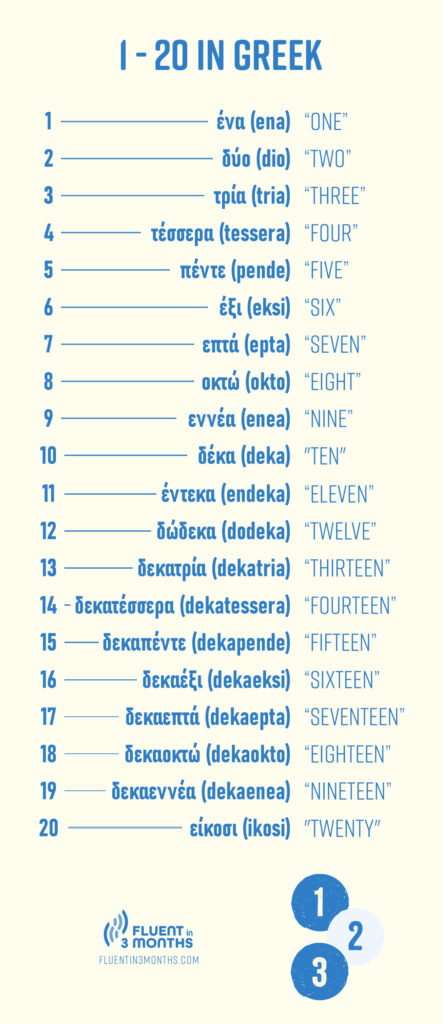
Are Greek numbers the same as English?
Greek numbers are different from English numbers. That said, some of them, for example, τρία (tria) and “three,” do sound similar. This can make it easier to remember the numbers in Greek.
Greek numbers also have some similarities with Latin languages. If you know Spanish numbers, think about the number eight: it’s οκτώ (okto) in Greek and ocho in Spanish — they sound similar.
What are the Greek number prefixes?
In other languages, such as English, some Greek words are used as prefixes to specify a number. “Mono” in “monopoly,” for example, comes from the Greek word μόνος (monos) that means “sole” or “only.” The Olympic sport “triathlon” consists of three sports: swimming, cycling, and running, and tri is the prefix that means “three.”
Here are the other number prefixes you might come across in science, math, or other words in daily life:
- 1: mono
- 2: di
- 3: tri
- 4: tetra
- 5: penta
- 6: hexa
- 7: hepta
- 8: octa
- 9: ennea
- 10: deca
What is zero in Greek?
“Zero” in Greek is μηδέν (miden).
Three, two, one, go!
Or should we say τρία, δύο, ένα go? Practice your Greek numbers by learning how to tell the time, going shopping and asking how much it costs, or using online resources!

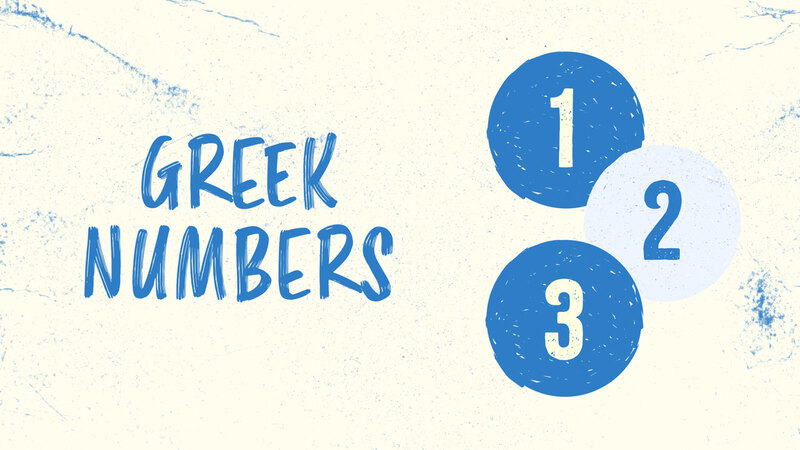

Social